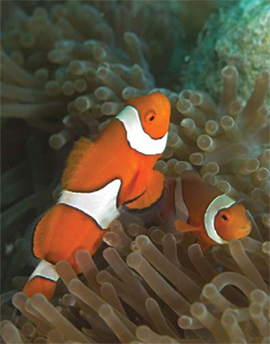Increasing carbon dioxide concentrations in the atmosphere may have an unexpected impact on marine ecosystems: disorienting fish larvae.
Research published in this week’s issue of the Proceedings of the National Academy of Sciences (PNAS) found that ocean acidification disrupts the olfactory sense of clownfish larvae, making it difficult for the fish to find a habitat, which for clownfish is a sea anemone. Through a symbiotic relationship, the sea anemone protects and nourishes the clownfish, which in turn, cleans the anemone.
Ocean acidification is linked to absorption of carbon dioxide (CO2) by oceans. As atmospheric concentrations rise due to CO2 emissions from fossil fuels and deforestation, oceans become more acidic. A number of other studies have shown that acidification has wide-ranging impacts on sea life, including making it more difficult for calcifying organisms like coral reef-building polyps and some types of plankton to form skeletons and protective shells. The new research indicates that acidification will also directly harm larger marine animals like fish.
 Adult orange clownfish Amphiprion percula form breeding pairs. Clownfish have been popularized by the character “Nemo” in Pixar’s 2003 film Finding Nemo. Photo courtesy of the National Academy of Sciences, PNAS. |
The study — conducted by scientists from universities in Australia, Russia, and Norway — used a series of experiments to test the responsiveness of clownfish to different pH levels. It found that clownfish, which are dependent on their sense to smell to find suitable habitat, are particularly sensitive to water chemistry. Clownfish larvae reared under conditions to mimic the pH forecast for the end of the century (pH 7.8) “exhibited significant differences in olfactory responses” to larvae raised under present-day conditions.
“In this case, acidification disrupted the olfactory mechanism by which clownfish larvae discriminate between cues that may be useful for locating suitable adult habitat and other cues that could lead larvae to unsuitable settlement sites,” the authors write. “Attraction to olfactory signals that are normally avoided, in combination with a reduced preference for favorable cues, could clearly cause fish larvae to be attracted to locations that are suboptimal for settlement or are devoid of settlement habitat.”
The scientists say the results are applicable to other species of fish as well.
“Olfactory cues appear to be a key mechanism by which the pelagic larvae of many coastal marine species identify and navigate toward adult habitat and then select suitable settlement sites,” they write. “Disruption to this process would have significant consequences for the replenishment of adult populations and could lead to the decline of many coastal species.”
“If acidification continues unabated, the impairment of sensory ability will reduce population sustainability of many marine species, with potentially profound consequences for marine diversity,” they continue. “Our results show that elevated CO2 and reduced seawater pH that could occur early next century in the world’s oceans can dramatically affect the behavioral decisions of marine organisms during critical stages of their life-history.”
Philip L. Munday, Danielle L. Dixson, Jennifer M. Donelson, Geoffrey P. Jones, Morgan S. Pratchett, Galina V. Devitsina, and Kjell B. Døving. Ocean acidification impairs olfactory discrimination and homing ability of a marine fish. PNAS Early Online Edition for the week of Feb 2-6.














